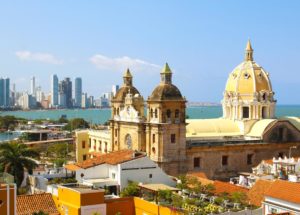Colombia: Single Registry of Foreign Workers implemented
On October 9 2018, the Ministry of Labor issued Resolution 4388, resulting in the implementation of the Single Registry of Foreign Workers in Colombia (RUTEC). This registry aims to collect and control the information of foreign workers in the country, allowing the Ministry:
control the information of foreign workers in the country, allowing the Ministry:
- To have first-hand knowledge of labor immigration.
- Monitor employment status and working conditions.
- Ensure full compliance with labor rights.
- Avoid abusive and illegal contracting practices.
Who does this apply to?
All entities or employers in the public and private sector that link or hire foreign persons within the Colombian territory. This includes dependent and independent foreign workers, including those with a Special Permit of Permanence (PEP), and embassy and consulate personnel.
Updating the record and validity times
The term granted for the registration of foreign personnel in the RUTEC is 120 days (counted from the contract end date or from the link of the foreign worker).
Once the registration has been made, they have a further 30 days to update the information. The registration of a foreign worker will have the same validity foreseen in the respective contract.
The Ministry of Labor may perform an inspection to ensure compliance. If any breach is found, it may impose sanctions 100-5,000 times the legal monthly salary (in U.S. dollars).
SIRE vs. RUTEC
Migración Colombia developed an Information System for the Report of Foreigners called SIRE. Foreign citizens are recorded in connection to hiring and the services they provide. The system also records information such as accommodation and lodging, national transportation, among others.
Although the SIRE and the RUTEC systems seek to monitor the foreign population, they have several differences:
- The entities in charge of each of the systems.
- The RUTEC wants first-hand information to create better immigration, social and labor policies.
It is worth noting that these systems are not exclusive. You must comply with the registration of information in both or face penalties.
Key considerations
- The RUTEC company registration requirement is currently a one-off.
- If the foreign national’s residence/contract is extended, a new registration will be required.
- Foreign nationals currently in Colombia must be registered.
- The registration is only applicable to foreign workers, not their dependents.
- The foreign national does not need to be present for the registration process.
- At the end of the assignment/work contract, a de-registration will be applied.
This summary was prepared using information obtained from Tannus & Asociados.
Disclaimer: The above information is provided for general information purposes only and should not be construed as legal advice. If you have any further inquiries regarding the applicability of this information, please contact our Global Operations Director of Immigration, Roberta Carnaccini.
Indonesia: Changes to work immigration rules
Further details of changes are now available in regards to new regulations for hiring foreign workers. The Ministry of Manpower (MOM) has published Regulation No. 10/2018, which was confirmed on November 1, 2018. The main changes are presented below.
on November 1, 2018. The main changes are presented below.
Expatriate Placement Plan (RPTKA) and Work Permit (IMTA)
- A notification of individual foreign workers’ details has replaced the IMTA. Once confirmed the individual can start work. The notification will be issued after all immigration fees are paid (the DPKK fee and the VTT/ITAS/MERP*/IT fee). The DPKK fee must be paid in U.S. dollars within 24 hours of issue. *Limited stay visa/temporary stay visa/multiple exit and re-entry permit.
- If the employer’s address is used for the notification application, the notification and the ITAS must be amended with the foreign national’s home address in Indonesia.
- The validity of the RPTKA is now based on the employment agreement for up to five years. However, the DPKK fee can only be paid for one year at a time. It is therefore likely that the notification is only valid for one year and renewed annually.
- There remains some confusion as to the maximum validity period of the ITAS. Based on the regulation of the Ministry of Law and Human rights (MLHR) No. 16/2018, the maximum validity is two years. Since the validity of the notification is one year only, it is likely that the ITAS can only be valid for one year and also extended annually.
- Previously, a limited stay visa could be collected at any of the 133 Indonesian embassies or consulates. This has been reduced to 22 missions: Bangkok, Beijing, Berlin, Davao City, The Hague, Dili, Guangzhou, Hong Kong, Jeddah Johor Bahru, Kota Kinabalu, Kuala Lumpur, Kuching, Los Angeles, Penang, Seoul, Singapore, Songkhla, Sydney, Taipei, Taiwan and Tokyo. This limited list may result in a significant burden for foreign national applicants and their families. It is expected that more locations will be added to the list in the near future.
- If the foreign worker has a new passport but the notification is registered with the old passport, the visa cannot be collected at the Indonesian Embassy. In this case, a new notification must be submitted and the DPKK, VTT, ITAS, MERP and IT fees paid again. Only the original DPKK fee may be refunded.
- The initial ITAS and MERP for the principal employee can now be processed at five immigration offices in Indonesia: Soekarno Hatta Airport in Jakarta, Juanda Airport in Surabaya, Ngurah Rai Airport in Bali, Kualanamu Airport in Medan and Batam Centre Port in Batam.
- ITAS extensions and ITAS for dependent family members can be processed at any local immigration office.
This summary was prepared using information obtained from Peregrine Immigration Management.
Disclaimer: The above information is provided for general information purposes only and should not be construed as legal advice. If you have any further inquiries regarding the applicability of this information, please contact our Regional Immigration Manager (APAC), Debbie Beynon.
Malaysia: Personnel authorized to handle immigration applications
On November 12, 2018, MYXpats via the ESD Portal, strictly enforced that only personnel named in the company’s Letter of Undertaking (LOU) will be allowed to handle immigration applications.
What is the LOU?
The LOU is a document that states the names of the following authorized personnel:
- Endorser/signatory – the person signing all of the application paperwork and receiving notifications from MYXpats.
- Login user – the person receiving notifications from MYXpats.
- Submission officers – the persons submitting applications, endorsements, passports and collecting passports.
If the current submission officer is different from the person listed in the LOU, the application cannot be submitted and/or passports cannot be submitted or collected.
The only exception is that a Malaysian employee can manage the endorsement submission and collection. This is provided that the employee shows proof of employment at the company.
Key considerations
Companies should review the names currently listed in their latest LOU to ensure that individuals are able to handle all immigration applications. Any changes to authorized personnel must be made immediately to MYXpats.
If the endorser/signatory is an individual who has already left the company, a new authorized signatory must quickly be identified and updated in the LOU.
If the submission officer is not correctly listed in the LOU, this should also be updated.
This summary was prepared using information obtained from the Expatriate Services Division, Immigration Department of Malaysia.
Disclaimer: The above information is provided for general information purposes only and should not be construed as legal advice. If you have any further inquiries regarding the applicability of this information, please contact our Regional Immigration Manager (APAC), Debbie Beynon.
Singapore: Immigration requirements for dependents
From February 1 2019, foreign-born dependents (aged 12 and below) will be required to submit proof of vaccinations for the following visas:
- Long Term Visit Pass (LTVP)
- Dependent Pass (DP)
- Student Pass
Proof must be given for diphtheria and measles to the Health Promotion Board (HPB) before an application can be made to the relevant authorities.
Parents/Guardians of dependents not due vaccinations are required to follow up after the child’s entry to Singapore.
Dependents born in Singapore are not required to submit the proof of vaccinations. The HPB will liaise with local hospitals directly for the vaccination records.
An exemption request must be accompanied by a doctor-certified letter to the HPB.
Existing long-term immigration pass holders will not be required to provide proof of vaccinations when applying for a new/renewal pass.
Key considerations
Applicants should expect longer lead times for LTVP and DP applications and to complete additional documents.
This summary was prepared using information obtained from Channel News Asia.
Disclaimer: The above information is provided for general purposes only and should not be construed as legal advice. If you have any further inquiries regarding the applicability of this information, please contact our Regional Immigration Manager (APAC), Debbie Beynon, or Immigration Manager – Singapore, Mahadir Khan.
We track policy changes in over 120 countries. Find out how we can help you in this short video.




